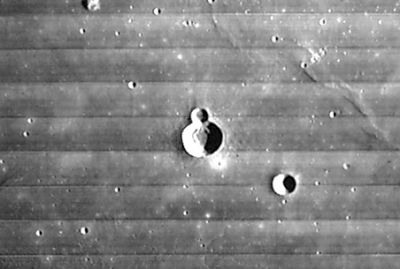Heis
Contents
Heis
|
Lat: 32.4°N, Long: 31.9°W, Diam: 14 km, Depth: 1.91 km, Rükl: 10 |

LOIV 139 H1 Heis is the crater in the center. The pit on its north rim is Heis A, and the crater to the southeast is Heis D.
Images
LPOD Photo Gallery Lunar Orbiter Images Apollo Images
AS15-P-10286 and AS15-P-10291 are two of Apollo 15's orbital ITEK-panoramic frames which show both Heis and Heis A (scroll all the way toward the frame's right margin).
Research: Danny Caes
Maps
(LAC zone 24D3) LAC map Geologic map
Description
Description: Elger
(IAU Directions) On the S.W. (of C. Herschel) lies a larger crater (Heis), which has a small but obvious crater on its N. rim, and casts a very prominent shadow at sunrise.
Description: Wikipedia
Additional Information
Depth data from Kurt Fisher database
- Arthur, 1974: 1.91 km
- Westfall, 2000: 1.91 km
- Viscardy, 1985: 1.91 km
Nomenclature
Eduard Heis (February 18, 1806 - June 30, 1877) was a German mathematician and astronomer. He made a series of observations of the night sky, including the milky way, zodiacal light, stars, and shooting stars. His star atlas, which was based on the Uranometria Nova, helped define the constellation borders in the northern sky. He was also the first person to record a count of the Perseid meteor shower in 1839, giving an hourly rate of 160. Observers have recorded the hourly count every year since that time.
- According to Whitaker (p. 224), this name, which was part of the original IAU nomenclature, was introduced by Schmidt. Elger refers to the crater as Delisle B. - Jim Mosher
LPOD Articles
Bibliography
Eduard Heis in the Sourcebook Project (William R. Corliss)
- In Mysterious Universe, a handbook of astronomical anomalies (1979) :
- Page 54: The Intra-Mercurial Planet or Planets (J.R.Hind, Nature, 1876).
- Page 275: On Luminous Matter in the Atmosphere (Henry Waldner, Nature, 1872).
- Page 287: The Stationary Radiation of Meteors (W.F.Denning, Observatory, 1913).